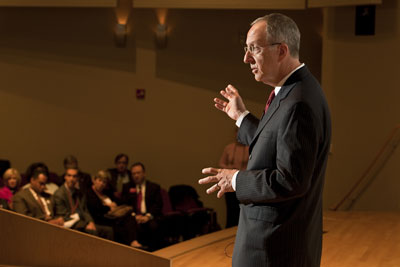Skorton: Cornell will realize its future by way of its past
By Susan Kelley

Over the next five years, Cornell will hire hundreds of "bold and brilliant" faculty, said President David Skorton in the annual State of the University address Oct. 23.
Cornell must return as soon as possible to a "healthy pace" of faculty hiring, which has recently been curtailed to address the university's financial difficulties, he said, delivering the speech in Statler Auditorium during the annual Cornell Trustee/Council Weekend.
"More broadly, for the near-term future, we need to shift our focus from bricks and mortar to people. The faculty are the soul of a great university," he said. He later added that when it comes to determining the future direction of Cornell's academics, "I'm depending on the people who know the university best: the faculty," he said. He and Provost Kent Fuchs are now reviewing recommendations from 14 faculty task forces on how to refocus the university's academic mission.
Throughout the address, he emphasized that the path to Cornell's future leads out of its past. "Come with me on a journey, a trip to the future of Cornell, a trip to the sesquicentennial in 2015, to a celebration of our first 150 years and the beginning of the next 150 years," he said. "We get to our future, I believe, by way of the past, by remembering Cornell's ideas and ideals."
To make the connection between Cornell's past and present, Skorton asked university archivists and historians to display a few of the university's historic objects, including a medieval illuminated manuscript and a Reuleaux machine, a 19th-century kinematic mechanism used to teach mechanical engineering. He also quoted extensively from past presidents, from A.D. White to Dale Corson and Frank H.T. Rhodes.
Skorton described how the four pillars on which Cornell was built -- classical and contemporary inquiry, innovative thinking, student access to education, and public engagement -- will remain relevant in the future.
The first pillar, classical and contemporary inquiry, "balances scientific and technical literacy with history, politics and language studies. Expansive and pragmatic, it requires students to acquire knowledge and think critically about it," he said. It is, Skorton added, "the most useful and the most versatile education of all." He committed to support and sustain the disciplines, such as the classics, that reinforce classical and contemporary inquiry.
Cornell also will continue to bolster the second pillar, faculty who "think otherwise," Skorton said. "In the Cornell tradition of promoting and protecting academic freedom and independent thought, we must ensure that our efforts to build the faculty of the future follow a faculty-driven trajectory and are not imposed from the top down."
In 2015, the university will welcome and support a diverse array of students, as it has from its beginning, he said. The third pillar -- education for the brightest students regardless of their ability to pay -- remains even more relevant today, he said. The university has increased financial aid since the economic downturn and has made it the top priority in the capital campaign, he noted.
Public engagement, the fourth pillar, will expand in depth and breadth through 2015. Cornell Cooperative Extension will diversify its local and regional programs in such areas as energy, the environment, nutrition, finances and personal health. And with 3,300 of 20,000 students coming from around the globe, the university will continue to serve as the land-grant university to the world, he said.
Of the four pillars, he said, "This is where we come from. This is the path we must follow ... giving us an ever more fair Cornell."
The address can be viewed online at CornellCast, http://www.cornell.edu/video/?videoID=507.
Media Contact
Get Cornell news delivered right to your inbox.
Subscribe